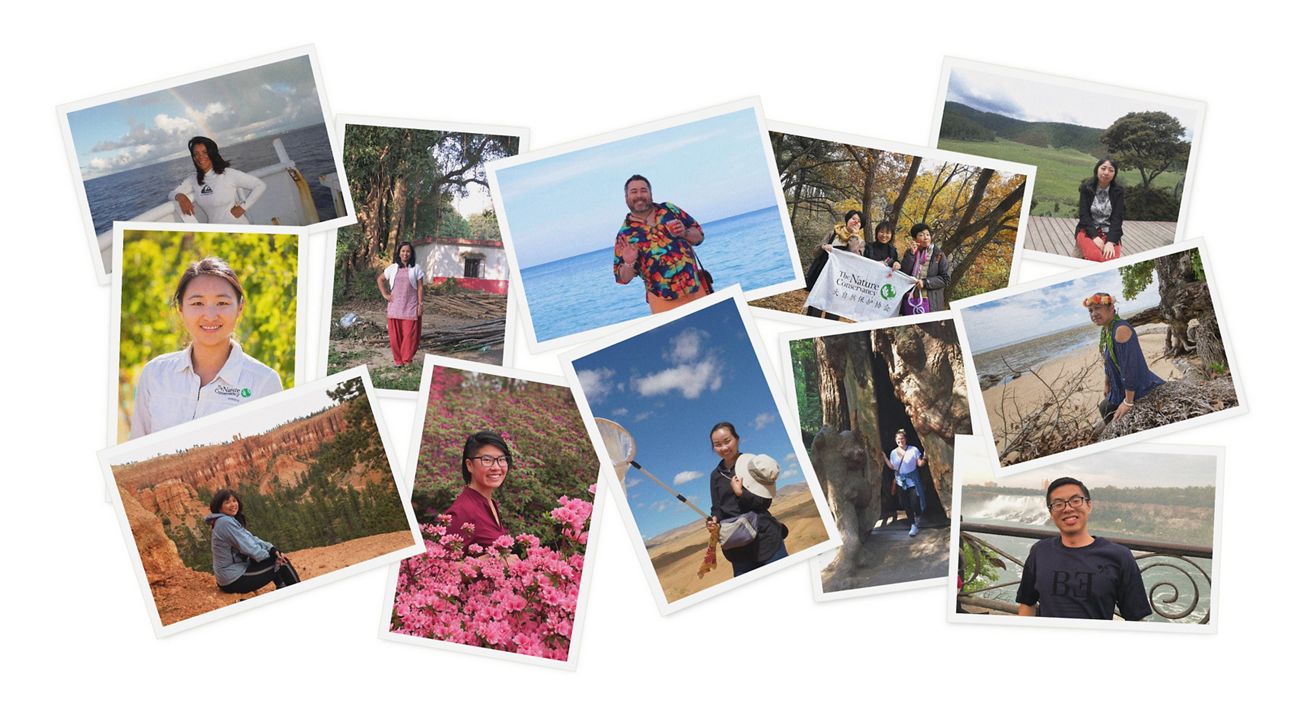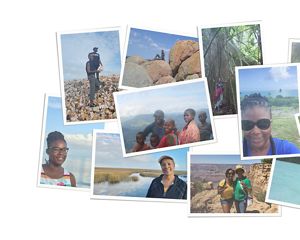Nature has long been an inspiration and foundation for Asian and Pacific Islander art, philosophy and governance. For example, the art of haiku dates back to the 13th century Japan and is a type of poem that is short, evocative and captures a moment in nature. For centuries, notable poets like Matsuo Bashō have crafted haikus that explore nature’s small joys and big mysteries. Today, twelve TNC staff members of Asian and Pacific Islander descent are speaking up for nature and sharing their reflections on conservation. Amidst a disturbing rise in anti-Asian violence and a silencing of Asian and Pacific Islander voices, we especially want to thank them for their time and insights.
Resonant and bright
Twelve voices across the world
Nature’s chorus sings
Nature’s Life Lessons
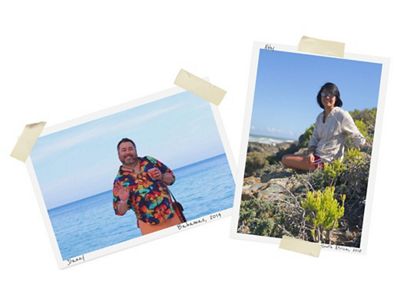
“When I was in first grade, I learned what it meant to be a ‘litterbug’ and its effect on our environment. At the end of our lesson, we were asked to sign a ‘contract’ to promise that we’d never litter. While it wasn’t a real contract, I took it to heart. From that day forward, almost 50 years later, I can honestly say I have never littered.”
-Danny McGibney, Senior IT Project Manager, Arlington, Virginia
“Growing up, I visited the beaches in Delaware every summer and I often saw horseshoe crabs that were stranded on their backs in the sand. Horseshoe crabs are very cool (they’ve been around since the dinosaurs!), but they also are very vulnerable when they are stuck like that. My parents taught me to gently flip them over by grabbing the sides of their shells (not their tails). And as an adult I use this same technique and teach it to others, too. My love of rescuing horseshoe crabs is representative of my keen desire to protect all wildlife—and people—and the best way to do that is by protecting our planet.”
-Abby Barber, Donor Relations Multimedia Specialist, Arlington, Virginia
Nature as a Sanctuary
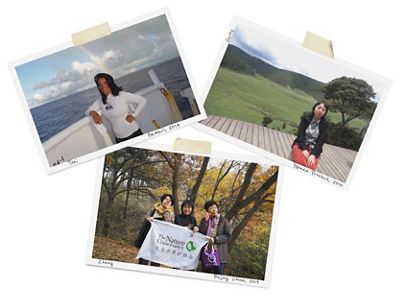
“I feel a great peace when I listen to the different sounds of nature: Wind blowing through trees and flowers, a stream meandering among mountains, rain beating down on the leaves and then falling on the dirt, birds flying and singing…”
-Tiantian (Gertie) Tang, HR Director, Beijing, China
“The ocean is my muse, my religion, my refuge. I came from a troubled childhood, and had a hard time adjusting as a young adult. I learned how to scuba dive the summer before college, which led me to join the scuba club at the university I attended. That changed my life. I started to eat, breathe and dream of the ocean. I connected with a like-minded group of ocean enthusiasts, I went diving every weekend, and I took every single course in marine biology that I could enroll in (even though I was a film major). The ocean was my savior, if you will, and I wanted to pay it back. That’s how I got into conservation.”
-Toni Parras, Director of Marketing and Communications, Honolulu, Hawaii
“The freedom and fresh air of being in nature brings me so much joy. In nature I can empty my mind and body, and it is as if I am being embraced by nature.”
-Yu Zhang, Associate Program Manager, Beijing, China
Nature and Cultural Values
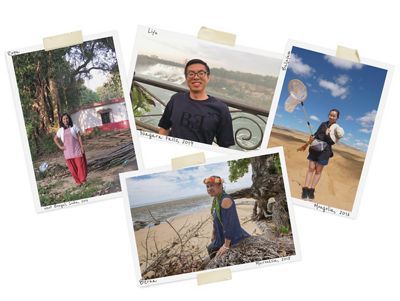
“Many Mongolians would be confused if you asked them how to live a ‘climate-friendly’ lifestyle, because living in harmony with nature is just our conventional way of living. Mongolia’s intact grasslands are a testament to our well-established cultural belief that we shouldn’t take more from nature than what we need. It was my desire to be a responsible global citizen which led me to return to the wisdom of nomadic traditions and minimize my consumption of modern life. Now, I am preserving the practices of pastoralists for a new generation and, moreover, I am advocating for others who wish to maintain these traditions, particularly as we are on the edge of critical transition.”
-Baljnyam Batjargal, Natural Resources Management Officer, Ulaanbaatar, Mongolia
“I’m very passionate about conservation because it is something that is ingrained in our island culture and traditions. Unfortunately, our culture’s core values are eroding just like our shores, but we have to keep fighting to ensure that our island home remains and can continue to provide the same bounty and safety that it provided our ancestors.”
-Berna Gorong, Conservation Planner, Yap, Micronesia
“Like many Bengalis who grew up in West Bengal, India, I was raised listening to the songs of Rabindranath Tagore (a Nobel Laureate poet and composer, among other things; 1861-1941). He had a song for every season and for every element. It was through his music that I first learned to admire and celebrate nature. Even today, whenever I feel at peace with nature, I find myself humming a tune of Rabindra Sangeet (Tagore’s Music) which my mother taught us as kids.”
-Rupa Datta, Manager, State Director Office & HR Operations, Providence, Rhode Island
“Nature is a bridge between me and my father. Like many other father-son relationships in Asian culture, we don’t really say we ‘love’ each other, or hug each other, but we enjoy spending time together in nature. My father loves to share his passion for Feng Shui, and I just simply enjoy the beautiful scenes. Now, I’m working for nature so that more families can enjoy it together.”
-Liyu He, Finance Manager, Arlington, Virginia
Representation in Conservation
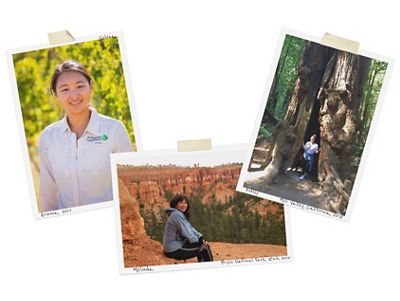
“Being an Asian American woman working with an international organization focused on protecting land and water gives me hope that people will come together from all parts of the world to conserve nature and minimize our environmental impact.”
-Ashley Flor, Conservation Programs Assistant, East Troy, Wisconsin
“Representation needs to be addressed in every aspect of our society, from mainstream media to environmental conservation. Society has pigeonholed people of API descent in very specific and limiting roles. To me, being a person of API descent in conservation means broadening our representation and showing that we are more than what society deems ‘acceptable’ for us.”
-Selena Pao, Verde River Transaction Coordinator, Camp Verde, Arizona
“It’s important that I do whatever possible to encourage young people of API descent to choose conservation as a career so that our values and perspectives have a role in the future of our world.”
-Melinda Ching, Senior Attorney, Honolulu, Hawaii
